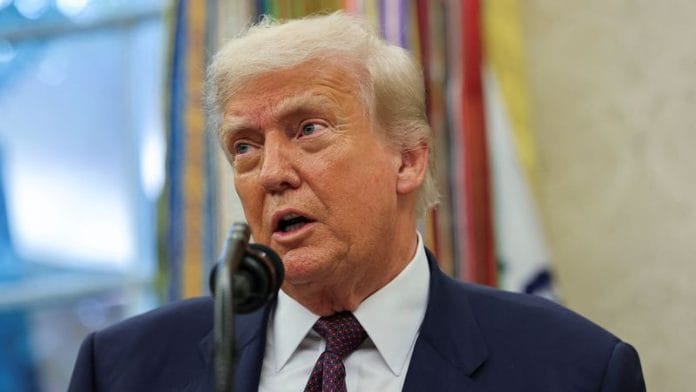Pakistan Army chief, Field Marshal Asim Munir, has threatened India with a nuclear attack if it dares to build a dam on the Indus River. More alarming than the threat itself is that he issued this warning while on American soil, in the presence of several senior military officials from the Trump administration. As reported by ThePrint, Munir is learnt to have said, “We are a nuclear nation. If we think we are going down, we’ll take half the world down with us if faced with an existential threat from New Delhi.”
This is probably the first time a foreign army chief has used American soil to issue a nuclear threat against India — and “half of the world.” That the Trump administration has remained a mute spectator to such an irresponsible and dangerous statement is disturbing. It should concern the Norwegian Nobel Committee, the body that awards the Nobel Peace Prize. Significantly, Munir’s threats also belie Trump’s tall claims about brokering peace between India and Pakistan.
While New Delhi was cautious in its response to Trump’s earlier claims, it should not let Munir’s remarks slide.
So far, India has responded to his threats with a measured, diplomatic, strategic, and multi-dimensional approach. Now, it needs to react firmly. The twin aim should be to punish Munir’s Pakistan militarily, and Trump’s US economically.
If that happens, no one but Trump would be responsible for dragging India-US relations back to the era of “estranged democracies”.
Also read: ThePrint Exclusive: Asim Munir’s India nuke threat from US ballroom—‘will take half the world down’
US understands the danger
In Tampa, Munir attended the retirement ceremony of outgoing US Central Command (CENTCOM) Commander General Michael Kurilla and the change-of-command ceremony for Admiral Brad Cooper, who succeeded him. Munir praised Kurilla’s leadership and his role in strengthening US–Pakistan military ties, while wishing Cooper success in tackling shared security issues. He also met the Chairman of the Joint Chiefs of Staff, General Dan Caine, inviting him to visit Pakistan. Munir also held talks with defence chiefs from several friendly countries on the sidelines.
The US President must recognise the seriousness of the threat posed by Pakistan’s nuclear programme to global security. It’s not as if he is unaware of it.
Former US president Barack Obama had warned that “battlefield nuclear weapons, by their very nature, pose [a] security threat.” Trump 1.0 endorsed these fears in 2017, with an official noting that the administration was worried about Pakistan’s nuclear weapons landing in the hands of terror groups. That same year, US Director of National Intelligence Daniel R Coats warned in his Worldwide Threat Assessment that Pakistan was developing new types of nuclear weapons, including short-range tactical weapons, sea-based and air-launched cruise missiles, and longer-range ballistic missiles, which “will introduce new risks for escalation dynamics and security in the region.”
So, clarity on the dangers of a nuclear-armed Pakistan exists in Washington. No wonder New Delhi is irked by Washington’s statement that its military partnership with Islamabad is “key to nuclear security in South Asia.”
Also read: There’s a method in Trump’s Pakistan romance. It’s all about Gulf security
India too needs to do more
For now, New Delhi has subtly conveyed its displeasure to the Trump administration for allowing Pakistan’s army chief to make such comments during his US visit, deploring Munir’s nuclear blackmail from the soil of “a friendly third country.”
It should move on to alerting the global community through a special resolution at the United Nations on the dangers posed by the destructive nuclear programme of a rogue state like Pakistan. In 2021, India warned the UN Committee on Disarmament about the potential dangers of Pakistan-based terrorists acquiring small arms and light weapons (SALW).
Domestically, the government should build consensus on pressing the Trump administration to distance itself from the Pakistan Army chief’s irresponsible, anti-India remarks made on US soil.
Any attack on India’s strategic and security infrastructure would be treated as an act of war. A tactical nuclear strike would invite a massive retaliation, as envisaged in India’s nuclear doctrine. The doctrine allows the use of nuclear weapons in response to chemical and biological weapons (CBW) attacks and specifies that any nuclear attack would be met with massive retaliation.
The No First Use (NFU) clause applies only to non-nuclear weapon states. Pakistan’s army chief should know the power of India’s nuclear retaliation capabilities before dreaming of “taking half the world down.” Pakistan’s existential threat comes not from India, but from its rotten socio-economic system and its state sponsorship of terror. Corrupt and trigger-happy generals have hijacked the political system and sold the country’s soul to the highest bidder. Asim Munir is no exception.
Seshadri Chari is the former editor of ‘Organiser’. He tweets @seshadrichari. Views are personal.
(Edited by Prashant)






